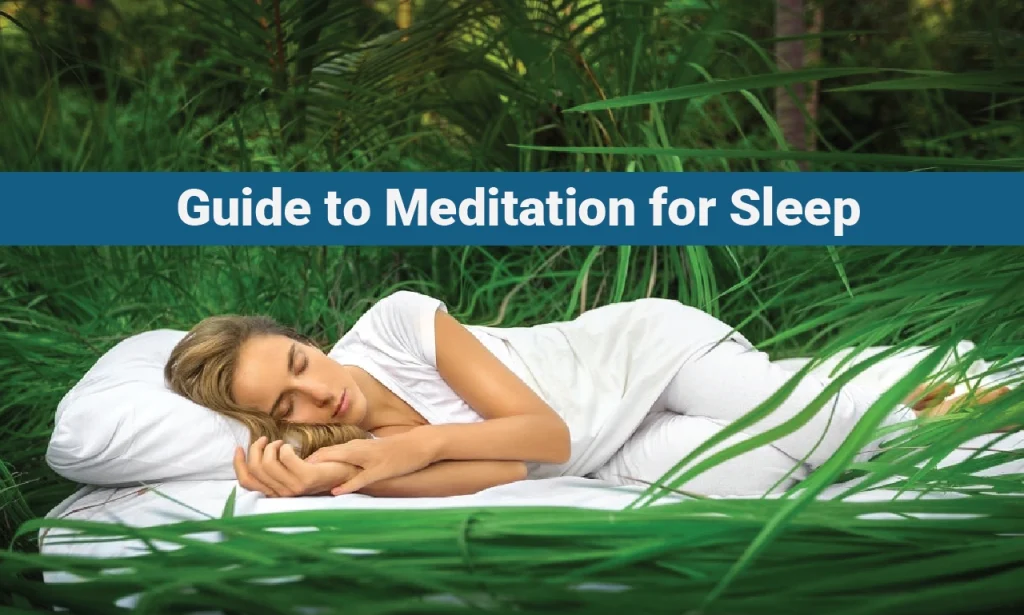Table of Contents
In the stillness of the evening, when the day’s echoes fade, many of us lie in the embrace of our sheets, seeking the solace of sleep. Yet, for some, the night is less a friend and more a puzzle, where rest is a sought-after treasure. Enter the ancient art of meditation—a practice as old as time, yet as relevant as ever in our modern quest for a night of deep and healing sleep.
Through the lens of mindfulness meditation, we begin to see a world of possibility for enhancing sleep quality. This isn’t just hopeful conjecture; it’s a path well-trodden by weary sleepers who have found solace in the silent dialogue between mind and body that meditation fosters. It’s a practice that doesn’t just quiet the mind, but actively engages it in the process of unwinding, allowing rest to take its natural course.
For those tossing in the tides of insomnia, the gentle rhythm of meditation offers a lifeline. It’s not a quick fix but a gradual realignment—a natural solution that beckons the sleep-deprived to a more peaceful slumber. The promise of meditation for sleep is not just in the number of hours we rest, but in the quality of rest we receive. It’s about transforming our relationship with the night, from one of struggle to one of harmony.
As we embark on this journey together, we’ll explore how meditation can be more than a mere bedtime ritual. It’s a promise—a promise of better sleep, a deeper sense of relaxation, and a newfound respect for the night. So, let us unfold the quiet power of meditation and discover how it can lead us to the restful haven we all deserve.
The Science of Sleep and How Meditation Helps

The quest for a good night’s sleep is as much a biological imperative as it is a pursuit of comfort. Sleep, that mysterious and essential state of rest, is governed by the intricate workings of our internal clocks and the ebb and flow of hormones like melatonin. It’s a time when our brains busily archive the day’s experiences, our cells repair themselves, and our bodies conserve energy. Yet, for something so natural, why is it that a restful night can sometimes be so elusive?
Enter the realm of meditation—a practice that has stood the test of time, now backed by modern science as a benefactor for our nocturnal struggles. Meditation, particularly mindfulness meditation, is like a gentle whisper to our overactive minds, signaling that it’s time to slow down and prepare for the night ahead. It’s a method that doesn’t just ease the mind but also sets a cadence for the body, aligning our physiological functions with the rhythm of sleep.
Research suggests that meditation activates the parasympathetic nervous system—the part of our autonomic nervous system that tells our body, “It’s time to relax.” This activation helps lower heart rate, reduce blood pressure, and ease into a state conducive to sleep. By focusing on the present moment and acknowledging thoughts without judgment, mindfulness meditation can reduce the stress and anxiety that often stand between us and a peaceful slumber.
Moreover, meditation has been shown to increase the production of melatonin, the hormone that regulates sleep, and enhance the brain’s gamma-aminobutyric acid (GABA) levels, which are associated with calming the nervous system. This biochemical shift not only helps us fall asleep faster but also improves the quality of sleep we enjoy, reducing the likelihood of waking up in the middle of the night and helping us wake up feeling more refreshed.
But perhaps the most profound way meditation helps is by changing our relationship with sleep itself. Instead of viewing sleep as a challenge to be conquered, meditation teaches us to welcome it as an old friend, to be greeted with a calm mind and a relaxed body. It’s not about forcing sleep but about creating the conditions that invite it in.
So, as we delve deeper into the science of sleep, let’s also embrace the wisdom of meditation. It’s a partnership that promises not just better nights but also brighter days, as the benefits of improved sleep ripple through every aspect of our well-being.
Understanding the Sleep Cycle

The sleep cycle is an intricate ballet of biological rhythms and brainwave patterns, a nightly performance that our bodies orchestrate in pursuit of restoration and rejuvenation. It’s divided into several stages, from the lightest threshold of sleep to the deep, restorative stages and the dream-filled realm of REM sleep. Each phase plays a critical role in maintaining our mental and physical health, yet it’s a cycle that can be easily disrupted by stress, anxiety, and the relentless pace of modern life.
This is where the subtle power of meditation techniques steps onto the stage. By introducing mindfulness and meditation into our evening routine, we can positively influence this cycle, leading to a significant improvement in sleep quality. Meditation serves as a gentle nudge to our nervous system, signaling that the hustle of the day has come to an end and the tranquil time of rest is upon us.
When we meditate, we engage in a practice that has been shown to enhance the transition from wakefulness to the first stage of sleep, making the threshold easier to cross. As we continue to descend into deeper sleep stages, meditation has laid the groundwork for our brain to reduce the frequency of brain waves, which is essential for that deep, non-REM sleep where our body does most of its healing work.
Moreover, regular meditation can help regulate our sleep patterns over time. It’s akin to tuning an instrument—the more consistently we practice, the more harmonious our sleep cycles become. This doesn’t just mean we might fall asleep faster; it also means we’re more likely to stay asleep, moving through the sleep stages in a rhythm that leaves us feeling more rested upon waking.
In essence, meditation doesn’t just help us “power down” for the night. It helps recalibrate our internal clock, smoothing out the wrinkles in our sleep patterns and allowing us to wake up not just because the alarm clock tells us to, but because our bodies are truly ready to rise.
The Effect of Mindfulness Meditation on Sleep Quality

In the quiet corners of scientific research, a growing body of evidence has been illuminating the profound impact of mindfulness meditation on sleep quality. It’s a dialogue between science and ancient wisdom that’s revealing just how powerful a mindful approach to bedtime can be.
Mindfulness meditation, a practice that encourages acute awareness of the present moment and a non-judgmental acceptance of one’s thoughts and feelings, has been shown to be a gentle but effective ally against the specters of sleeplessness. Studies in this field suggest a compelling narrative: individuals who integrate mindfulness into their nightly routine often experience better sleep.
One such study, published in the journal JAMA Internal Medicine, found that participants who practiced mindfulness meditation reported fewer instances of sleep disturbance than those who didn’t. The meditators, it seemed, were able to create a buffer against the mental chatter and worries that often escort us to bed and keep us from surrendering to sleep.
But how does mindfulness work its magic? By fostering a state of relaxation and detachment from stressful thoughts, mindfulness meditation can reduce the physiological arousal that often accompanies insomnia. This means a lower heart rate, reduced blood pressure, and a calmer state of being—all conducive to drifting off into a peaceful slumber.
Moreover, mindfulness meditation has been linked to an increase in melatonin levels, the hormone that regulates sleep, and a decrease in cortisol, commonly known as the stress hormone. This hormonal balance is crucial for initiating and maintaining a restful night’s sleep.
The ripple effect of these changes is not just a quicker passage to dreamland but also an improvement in the overall quality of sleep. With mindfulness, sleep becomes more than just a period of unconsciousness—it transforms into a restorative process, enhancing our ability to process emotions, consolidate memories, and rejuvenate our bodies.
In essence, the studies on mindfulness meditation paint a picture of a natural, accessible means of achieving a night of high-quality sleep. It’s a practice that asks for nothing more than a few moments of your time before bed, yet offers back a wealth of nocturnal riches—a testament to the adage that sometimes, the simplest remedies are the most profound.
Meditation vs. Insomnia: Can It Really Help You Sleep Better?

Insomnia, the all-too-familiar adversary of rest, often feels like a puzzle with a missing piece. It’s a condition that can be as stubborn as it is debilitating, leaving many to wonder if there’s any real respite that doesn’t come in the form of a pill. This is where the gentle power of a meditation program steps into the limelight, offering not just hope, but tangible results for those wrestling with sleep disturbances.
The question that hovers in the night air is clear: Can meditation genuinely provide the key to a better night’s sleep for those plagued by insomnia? The answer, illuminated by a constellation of studies and anecdotal evidence, is increasingly affirmative.
Meditation, particularly when practiced consistently as part of a structured program, has shown promising potential in helping individuals find their way back to the restful embrace of sleep. It’s not an instant cure, but rather a practice that, over time, equips the mind with the tools to wind down more effectively. For many, meditation becomes a ritual that signals the body it’s time to dim the lights on the day’s worries and enter a state of rest.
One of the ways meditation aids in this battle against insomnia is by fostering mindfulness—a mental state where one is fully present in the moment, aware but not ensnared by the mind’s usual torrents of thought. This mindfulness creates a buffer against the anxiety and stress that often fuel insomnia. By learning to observe thoughts without getting entangled in them, those who meditate can break the cycle of rumination that frequently sabotages sleep.
Furthermore, meditation encourages the practice of techniques such as focused breathing and guided imagery, which can directly combat the hyperarousal associated with insomnia. These techniques help to lower the heart rate and blood pressure, coaxing the body into a state of relaxation that’s conducive to sleep.
It’s also worth noting that meditation promotes habits that are beneficial for sleep hygiene. Regular practitioners often find themselves more attuned to the rhythms of their bodies, more likely to adhere to consistent sleep schedules, and more aware of the importance of creating a restful environment—factors that are all critical in managing insomnia.
In essence, while meditation is not a silver bullet, it is a valuable ally in the quest for rest. For those lost in the labyrinth of insomnia, a meditation program can be a compass—pointing toward a path of less resistance, leading to the peaceful slumber that has seemed so distant.
Types of Meditation to Improve Sleep
Mindfulness Meditation for a Restful Night

In the quest for the sandman’s favor, mindfulness meditation emerges as a gentle yet powerful ally. This practice, rooted in the art of being present, extends an invitation to a restful night by teaching us to dwell in the now, leaving behind the day’s worries and tomorrow’s plans.
But how exactly does mindfulness meditation weave its calming spell for better slumber? It begins with the breath—the steady, rhythmic anchor that holds us in the present moment. By focusing on the breath, we engage in a natural process that slows down the racing thoughts and eases the body into a state of relaxation. This simple act of breathing with intention is often enough to signal to the body that it’s time to transition from the wakeful buzz of activity to the serene lull of sleep.
As we sit or lie down to meditate, we become observers of our own thoughts. Mindfulness teaches us to acknowledge these thoughts without judgment or engagement, allowing them to pass like clouds on a windy day. This detachment is crucial, as it prevents the mind from spiraling into the stress and anxiety that can disrupt sleep. Instead, we find ourselves in a peaceful state of mental clarity, where the chatter of the mind is subdued, and the whispers of sleep grow louder.
The beauty of mindfulness meditation lies in its simplicity and accessibility. It doesn’t require special equipment or extensive training. Whether it’s through guided sessions or personal practice, mindfulness can be adapted to fit into any nightly routine. And as we incorporate it into our lives, we may find that its benefits extend beyond just improved sleep quality; it can also enhance our overall sense of well-being.
Studies have shown that individuals who practice mindfulness meditation experience a significant improvement in sleep quality. They not only fall asleep faster but also enjoy a deeper, more restorative sleep. This is because mindfulness meditation can increase the density of rapid eye movement (REM) sleep, the stage associated with dreaming and emotional processing, leading to a more restful night and a more refreshed awakening.
In essence, mindfulness meditation doesn’t just help us sleep; it reacquaints us with the natural rhythms of our bodies. It’s a practice that, night after night, can transform our relationship with sleep—from a nightly challenge into a welcome respite, a time of healing, and a foundation for a vibrant, awake life.
Guided Sleep Meditation: A Journey to Deep Sleep
Guided sleep meditation is akin to having a compassionate guide leading you by the hand through the often tangled forest of your own thoughts, straight into the heart of a peaceful slumber. It’s a form of meditation that employs a voice—either in person or through a recording—that instructs you step by step, breath by breath, into a state of deep relaxation and rest.
The role of guided meditation in the sleep process is both practical and profound. For those who find their minds buzzing with the day’s events or fretting over the worries of tomorrow, a guided meditation offers a focal point, a narrative to which they can anchor their attention. This external guidance is particularly helpful for individuals who may struggle to direct their focus inwardly or who find the silence of their own company too loud when trying to fall asleep.
As the guide’s voice weaves through calming visualizations or progressive muscle relaxation techniques, the meditator is gently coaxed away from the edge of wakefulness. The guide’s instructions serve as stepping stones, leading away from the wakeful mind preoccupied with thoughts and into a restful state where sleep is the natural next step. The voice acts as a soothing balm, often accompanied by tranquil music or the soft sounds of nature, to create an environment conducive to sleep.
Guided sleep meditation can be particularly effective for those who experience sleep anxiety. The presence of a guiding voice can be reassuring, a reminder that they are not alone in their journey to rest. It can also introduce a sense of routine and safety, two elements that are crucial for a good night’s rest.
Moreover, this type of meditation can help establish a healthy bedtime ritual. Over time, the mind begins to associate the sound of the guided meditation with sleepiness, much like how a child learns to associate a lullaby with bedtime. This conditioning can significantly shorten the time it takes to fall asleep, as the body begins to respond to the meditation as a cue that it’s time to wind down.
In essence, guided sleep meditation doesn’t just assist in the moment; it’s a tool that, with regular use, can reshape one’s entire approach to sleep. It’s a journey that promises not just a single night of rest, but a future of nights filled with the kind of deep, restorative sleep that is the foundation of a healthy, joyful life.
- Body Scan Meditation to Release Tension Body scan meditation is a practice that invites a harmonious dialogue between mind and body, a gentle exploration of the physical self that can lead to profound relaxation. It’s a methodical journey through each part of the body, paying mindful attention to areas of tension and consciously releasing them. This practice not only helps in finding a comfortable position to rest but also prepares the body for sleep by dissolving the day’s accumulated stress. Imagine the body as a landscape, with hills and valleys, each holding its own story of the day’s labors. Body scan meditation is like a soft light that glides over this terrain, bringing warmth and ease to every corner. Starting from the toes and moving slowly upwards, the practice involves noticing sensations without judgment, whether it’s tightness, warmth, or even numbness. The key is in the noticing — not trying to change anything, just bringing awareness to what is. As this mindful attention sweeps through the body, something remarkable happens. Muscles that have been clenched in anticipation or from habitual posture begin to loosen. The breath deepens, becoming an ally in the process of unwinding. With each exhale, there’s an opportunity to let go a little more, to sink deeper into the mattress, and to edge closer to the realm of sleep. Body scan meditation is particularly effective in the pre-sleep ritual because it directly addresses the physical discomforts that often sabotage our efforts to fall asleep. By methodically focusing on each part of the body, we grant ourselves the chance to adjust our position, to fluff the pillow just right, to let go of the furrow in the brow, and to soften the jaw. It’s a process that tells the body, in a language it understands, that it’s safe to let go of the day’s burdens and to embrace the restorative power of sleep. Moreover, this practice can serve as a powerful antidote to the mental chatter that often accompanies us to bed. As we shift our focus from thoughts to sensations, the mind’s volume knob is turned down, and the whispers of sleep grow louder. It’s a transition from doing to being, from thinking to feeling — a transition that gently ushers in a night of peaceful, unencumbered sleep. In essence, body scan meditation is not just a technique for relaxation; it’s a nightly ritual of self-care. It’s a way to honor the body’s need for rest, to acknowledge and release the tensions of the day, and to set the stage for a night of deep, healing sleep.
How to Meditate for Better Sleep
Preparing Your Mind and Environment

Embarking on a journey towards better sleep through meditation begins long before your head nestles into the pillow. It’s a ritual that intertwines the readiness of the mind with the serenity of the environment, crafting a sanctuary conducive to rest. Establishing a sleep hygiene routine that incorporates meditation for insomnia is akin to setting the stage for a play where the final act is a peaceful night’s sleep.
Preparing your mind for sleep is an exercise in intentionality. It starts with winding down activities as the evening progresses, signaling to your brain that the hustle of the day is transitioning into the calm of night. Dimming the lights, perhaps lighting a candle with a soothing scent, can cue a sensory acknowledgment that sleep is near. Engaging in a brief meditation or mindfulness practice helps to anchor this transition, allowing thoughts and worries to drift away with each focused breath.
Your environment plays an equally pivotal role. A bedroom that invites relaxation is essential—think of it as crafting a nest that cradles you into slumber. This means considering the comfort of your mattress, the softness of your sheets, and the ambiance of your room. A cluttered space can lead to a cluttered mind, so tidiness can have a surprisingly calming effect. The temperature, too, should be cool, mimicking the body’s natural drop in temperature as it prepares for sleep.
When it comes to meditation for insomnia, consistency is key. This doesn’t necessarily mean a lengthy practice; even a few minutes can be potent. The goal is to integrate meditation into your nightly routine until it becomes as habitual as brushing your teeth. Over time, this practice can recalibrate your body’s internal clock, easing the symptoms of insomnia.
A simple meditation might involve sitting or lying comfortably and bringing attention to the breath, noticing the rise and fall of the chest, the sensation of air at the nostrils, the gentle rhythm that is uniquely yours. Guided meditations specifically designed for sleep can also be helpful, providing a narrative that leads the mind away from the day’s concerns and into a restful state.
In essence, preparing both mind and environment for sleep through meditation is about creating a ritual of tranquility. It’s a commitment to honoring the night by giving yourself the best possible chance to embrace its restorative gifts. With each evening’s practice, you’re not just aiming for better sleep that night; you’re nurturing a lifelong friendship with rest.
Short Meditation Practices for Sleep
In the tapestry of night, when sleep seems just out of reach, short meditation practices can be the golden threads that guide us back to rest. These simple, yet profound techniques are designed to be accessible to all, regardless of experience with meditation, and can weave a sense of calm through the fabric of your evening. Let’s explore a few simple meditation practices that can significantly improve your sleep.
Mindful Breathing Begin with mindful breathing, which can be done lying down or sitting comfortably. Close your eyes and take a few deep, intentional breaths. Then, allow your breathing to return to its natural rhythm. Focus your attention on the sensation of the air entering and leaving your nostrils, or the rise and fall of your abdomen. If your mind wanders, gently bring your focus back to your breath. Just a few minutes of this practice can signal to your body that it’s time to wind down.
Visualization
Visualization is another potent practice that can transport you from a state of wakefulness to the cusp of sleep. Picture a serene environment, perhaps a quiet beach at sunset or a soft meadow under starlight. Imagine yourself in this place, engaging all your senses. What do you see, hear, and feel? This mental imagery can distract from stress and lead you toward a peaceful night’s sleep.
Gratitude Reflection
Engaging in a gratitude reflection can also prepare your mind for rest. Quietly reflect on three things you are grateful for from your day. This positive reflection can shift your mindset away from negative or stressful thoughts and release a warmth that soothes the spirit, making sleep more inviting.
Body Scan
A brief body scan can release physical tension that may be hindering sleep. Start at your toes and move your awareness up through your body, gently noticing any sensations or areas of tightness without trying to change them. With each exhale, imagine releasing tension from each body part. By the time you reach your head, your body may feel lighter and ready for sleep.
Loving-Kindness Meditation
Finally, loving-kindness meditation can be a comforting way to end the day. Silently repeat phrases of goodwill towards yourself and others, such as “May I have peaceful rest” or “May all beings be happy and free of suffering.” This practice can create a sense of connection and peace, fostering a state conducive to sleep. Incorporating these short meditation practices into your nightly routine need not be time-consuming; even five to ten minutes can make a profound difference.
They are like soft whispers to the soul, reminding it that the day is complete and it’s now time to rest. With regular practice, these meditations can become a signal to your body and mind, a gentle cue that it’s time to let go of the day and welcome the embrace of sleep.
When to Meditate Before Bed for Optimal Sleep Quality
Timing can be everything when it comes to weaving meditation into your nocturnal tapestry. To optimize its benefits for quality sleep, it’s not just about the act of meditating, but also about when you choose to do so. The sweet spot for meditation can vary from person to person, but there are general guidelines that can help you determine the best time to meditate before bed.
The Golden Hour
Many sleep experts suggest engaging in meditation during the ‘golden hour’—the last hour before you turn out the lights. This is typically a time when the body naturally begins to wind down, and the mind starts to quiet. Meditating during this period can enhance the body’s natural progression towards sleep, making the transition smoother and more profound.
Post-Dinner, Pre-Sleep
For some, a meditation session right after dinner can serve as a digestive and mental segue, helping to create a clear division between the day’s activities and the evening’s rest. This can be particularly effective if you find that your mind tends to race with tasks and to-dos as soon as you hit the pillow.
Customizing Your Timing
However, the most effective time for you might require some experimentation. If meditating too close to bedtime leaves you feeling more alert, you might want to try meditating earlier in the evening. Conversely, if you’re someone who tends to doze off during meditation, saving it for right before bed could be the perfect preamble to sleep.
Consistency is Key
Regardless of the exact time, consistency is the thread that binds the practice together. By meditating at the same time each night, you create a cue for your body and mind, reinforcing the habit and the association between meditation and sleep.
Mindful of Overstimulation
It’s also important to be mindful of not meditating immediately after engaging with screens or other stimulating activities. Allowing some buffer time between screen use and meditation can help ensure that the calming effects of the practice are not overshadowed by the lingering buzz of digital stimulation. In essence, the best time to meditate before bed is a confluence of personal rhythm and lifestyle, a time when the mind is receptive, and the body is ready to embrace the stillness that precedes sleep. Finding this moment in your evening can transform your meditation practice into a reliable bridge to quality sleep, night after peaceful night.
Benefits of Sleep Meditation
From Stress Relief to Sleep Quality
In the symphony of sleep strategies, sleep meditation plays a melodious tune that harmonizes the need for rest with the desire for tranquility. It’s a practice that not only helps to dissipate the day’s stress but also sets the stage for healthy sleep. Let’s delve into how this gentle practice can be a nightly ally, helping you to sleep better and embrace the myriad benefits that come with it.
A Balm for the Busy Mind
Sleep meditation acts as a soothing balm for the busy mind, a way to quiet the internal chatter that often leads to the tossing and turning of restlessness. By focusing on the breath or a calming visualization, sleep meditation lowers the volume of thoughts, allowing the mind to settle into a state of readiness for sleep.
The Stress-Sleep Connection
Stress and sleep have a reciprocal relationship; high stress can lead to poor sleep, and poor sleep can increase stress. Sleep meditation breaks this cycle by addressing the root of stress. It encourages the body to release tension, the mind to clear, and the nervous system to shift from the fight-or-flight response to a state of rest and digest. This relaxation response is the precursor to deep, restorative sleep.
Hormonal Harmony
On a physiological level, sleep meditation can influence the body’s hormone production, encouraging the release of sleep-promoting hormones like melatonin while reducing the production of cortisol, the stress hormone. This hormonal balance is crucial for initiating and maintaining a restful night’s sleep.
Deepening the Depths of Sleep
Regular practice of sleep meditation can also enhance the quality of sleep by increasing the time spent in deep sleep—the most restorative phase. This is the stage of sleep where the body repairs itself, and the mind consolidates memories and learning from the day.
Emotional Equilibrium
Moreover, sleep meditation can lead to better emotional regulation. A good night’s sleep has been linked to improved mood and better cognitive function, which means that the benefits of sleep meditation extend well beyond the night and into the next day.
A Foundation for Healthy Sleep Habits
Incorporating sleep meditation into your nightly routine can also help establish and reinforce healthy sleep habits. It can be a signal to your body that it’s time to power down, creating a ritual that your mind and body begin to associate with sleep.
In essence, sleep meditation is more than just a tool for falling asleep; it’s a practice that nurtures overall well-being. It’s a nightly investment in your health, offering stress relief, improved sleep quality, and a foundation for a life lived with more ease and vitality.
Meditate for Better Sleep: The Long-Term Effects
When we think of meditation for sleep, it’s easy to focus on the immediate soothing effects that lead to a night of rest. However, the true beauty of this practice is revealed in its long-term symphony—a crescendo of benefits that extend far beyond the quiet hours of the night. Let’s explore the enduring benefits of sleep meditation on sleep quality and the ripple effects on daytime functioning.
Cultivating a Resilient Response to Stress
Over time, regular sleep meditation cultivates a more resilient response to stress. It’s like strengthening a muscle; each session builds your ability to enter a state of relaxation more quickly and deeply. This enhanced stress resilience means that the challenges of the day are less likely to intrude upon the night, promoting sustained improvements in sleep quality.
Reinforcing Circadian Rhythms
The practice of meditating consistently before bed can also reinforce the body’s natural circadian rhythms. Like a dance partner who learns your steps over time, the body begins to anticipate and align with the rhythm of your sleep meditation practice, leading to more regular sleep-wake cycles and overall improved sleep patterns.
Enhancing Cognitive Function
With improved sleep quality comes enhanced cognitive function. Sleep meditation can lead to better focus, sharper memory, and more efficient problem-solving abilities. It’s as if each night of meditation-infused sleep dusts off the cobwebs in the mind, allowing for clearer thinking and concentration during the day.
Emotional Balance and Well-Being
The long-term practice of sleep meditation can also contribute to emotional balance. By improving sleep quality, you’re likely to experience fewer mood swings and a greater sense of well-being. It’s akin to giving your emotions a smoother, more even terrain to travel on, rather than a path riddled with the potholes of sleep deprivation.
Physical Health Benefits
The benefits extend to physical health as well. Chronic sleep disruptions are linked to a host of health issues, from heart disease to obesity. By improving the quality of your sleep through meditation, you’re also supporting your body’s ability to repair and maintain itself, potentially reducing the risk of such conditions.
Daytime Impairment and Quality of Life
Lastly, the long-term effects of sleep meditation can significantly reduce daytime impairment. This means fewer days clouded by the fog of fatigue and more days lived with vitality and presence. It’s about enhancing the quality of your days, not just your nights, leading to a more fulfilling and productive life.
In essence, to meditate for better sleep is to invest in a practice that pays dividends in every waking moment. It’s a commitment to nurturing not just the quantity of your sleep, but the quality of your entire life experience.
Potential Risks and Considerations of Meditation for Sleep
When Meditation Might Not Help

While meditation is often lauded for its serene path to slumber, it’s important to navigate this path with eyes open to potential stumbling blocks. Understanding the risks of meditation and recognizing when it may not improve sleep is crucial for those seeking rest through this ancient practice.
Overstimulation Before Bedtime
For some individuals, meditation can act as a mental stimulant. If engaging in certain types of meditation before bed—particularly those that encourage deep contemplation or significant emotional processing—it might inadvertently lead to increased mental activity rather than calming the mind down. This kind of overstimulation can delay sleep rather than encourage it.
Uncovering Underlying Issues
Meditation encourages introspection and awareness, which can sometimes bring to surface underlying psychological issues or unresolved emotional turmoil. For individuals with a history of trauma or anxiety disorders, certain meditation practices can trigger distressing thoughts or feelings, which may disrupt sleep. It’s important to approach meditation with caution and consider seeking guidance from a mental health professional if this is a concern.
Incorrect Practice
There’s also the risk of incorrect practice. Meditation seems simple, but it’s a nuanced art. Without proper guidance, beginners might find themselves focusing too hard to clear the mind, creating tension rather than relaxation. This effort to ‘do it right’ can become counterproductive, leading to frustration and a more alert state.
Physical Discomfort
Physical discomfort during meditation can also be a barrier to its sleep-inducing benefits. An uncomfortable position or environment can distract from the practice and prevent the relaxation needed for sleep. Ensuring a comfortable meditation posture and setting can mitigate this risk.
Dependence on Meditation
There’s a potential for developing an over-reliance on meditation for sleep, where the absence of the practice could lead to anxiety and sleeplessness. It’s important for meditation to be part of a broader strategy for good sleep hygiene, rather than the sole method relied upon.
Recognizing Individual Differences
Finally, it’s essential to recognize individual differences. Meditation is not a one-size-fits-all remedy. What works for one person may not work for another. Personal experimentation and possibly the guidance of a meditation instructor can help tailor the practice to individual needs and sleep patterns.
In essence, while meditation is a beneficial practice for many, it comes with nuances that require attention. Being mindful of these potential risks and considerations can help ensure that meditation serves as a helpful ally in the pursuit of restful sleep, rather than an unintended hindrance.
Balancing Expectations: Meditation as a Sleep
Aid In the quest for nocturnal bliss, meditation often appears as a beacon of hope—a gentle, non-pharmaceutical sleep aid that promises rest and rejuvenation. However, it’s essential to approach this practice with balanced expectations and an understanding of its role in sleep enhancement.
Setting Realistic Expectations
Meditation can be a powerful tool for improving sleep, but it’s not an instant fix. It requires patience and consistency. The benefits, while potentially profound, typically accrue over time rather than after a single session. It’s important to view meditation as a sleep aid as part of a broader commitment to overall health and well-being, rather than a quick solution to sleep challenges.
Gradual Improvement Over Time
For many, the sleep-promoting effects of meditation are subtle at first. You might notice that you’re a little more relaxed each night, or that you’re finding it easier to let go of the day’s stress. Over time, these small changes can lead to significant improvements in both the ease of falling asleep and the quality of sleep itself.
When Immediate Results Aren’t Felt
It’s also crucial to acknowledge that meditation doesn’t work for everyone in the same way. If you don’t feel immediate results, it doesn’t necessarily mean you’re doing something wrong or that meditation isn’t for you. It may simply mean that you need to adjust your practice or try different styles of meditation to find what best suits your needs.
Consulting a Professional
Before embarking on a meditation journey, especially if you have existing health concerns, it’s wise to consult a doctor. This is particularly important for those with mental health conditions, as meditation can sometimes bring up emotional issues that require professional support. A healthcare provider can offer guidance on how to incorporate meditation into a treatment plan safely and effectively.
Complementary to Medical Advice
Meditation should be seen as a complement to, not a replacement for, medical advice. If sleep issues persist or if there’s a possibility of an underlying sleep disorder, professional evaluation is necessary. Meditation is a piece of the puzzle, not the entire picture.
Embracing the Practice
Finally, embrace meditation for what it is—a practice. This means there’s an element of learning and growth involved. Each session is an opportunity to understand your mind and body better, to cultivate a relationship with sleep that is kind and patient. In essence, meditation can be a valuable ally in the pursuit of better sleep, but it’s important to approach it with realistic expectations and a sense of exploration. When used thoughtfully and in conjunction with professional advice, it can be a significant step toward achieving the restful nights that are so essential to our well-being.
Key Takeaways
As we draw the curtains on our exploration of the nocturnal embrace that meditation offers, let’s reflect on the key insights that can guide us into the arms of Morpheus with greater ease.
The Soothing Power of Meditation
First and foremost, we’ve seen that meditation can improve sleep by serving as a gentle off-ramp from the bustling highway of daily life. It provides a transition into a more peaceful state of being, preparing both mind and body for the restorative process of sleep.
Cultivating Better Sleep Habits
The benefits of meditation extend into the realm of sleep habits. Regular meditation fosters a routine that signals to our internal clock that it’s time to wind down, reinforcing a natural rhythm that can lead to more consistent and restful sleep patterns.
Mindfulness Meditation: A Quality Enhancer
We’ve highlighted the profound effect of mindfulness meditation on sleep quality. This practice isn’t just about closing our eyes and hoping for the best; it’s an active engagement with the present moment that can quiet the mind and soothe the nervous system, setting the stage for deeper and more satisfying sleep.
The Long-Term Symphony
Moreover, the benefits of meditation don’t just flicker out with the morning light. They compose a long-term symphony of improved mental clarity, emotional stability, and physical well-being, all of which are supported by the foundation of good sleep.
A Practice of Patience and Personalization
It’s important to remember that meditation is a personal journey and one that requires patience. There’s no one-size-fits-all approach, and the practice should be tailored to fit the unique contours of your life and sleep needs.
Balancing Expectations with Exploration
Lastly, while meditation is a powerful tool, it’s essential to balance expectations with exploration. Not every meditation style will be the perfect fit, and it’s okay to experiment and consult professionals to find your best path to restful sleep.
In sum, meditation offers a sanctuary for those seeking refuge from the restlessness of the night. It’s a practice that nurtures the night’s rest, enriches the day’s wakefulness, and ultimately, enhances the tapestry of our lives with threads of tranquility and resilience.
FAQ
How Long Should I Meditate Before Bed?
The ideal duration of meditation for better sleep doesn’t adhere to a strict stopwatch; rather, it aligns with personal comfort and schedule. For beginners, starting with 5 to 10 minutes can be effective and is often more manageable. As you become more accustomed to the practice, you might extend the duration to 20 minutes or longer if it feels beneficial. The key is consistency and allowing the meditation to be long enough to signal to your body that it’s time to transition to sleep, without it being so long that it becomes a chore.
Can Meditation Replace Sleep?
It’s a common misconception that meditation can serve as a substitute for sleep. While meditation is restorative and can enhance the quality of sleep, it cannot replace the physiological processes that occur during sleep. These processes are crucial for physical repair, cognitive function, and emotional regulation. Meditation should be viewed as a complement to sleep, helping to create a more conducive state for deep rest, rather than a replacement.
What Type of Meditation is Best for Sleep?
When it comes to sleep problems, the type of meditation that may be most beneficial can vary from person to person. Mindfulness meditation, which focuses on the breath and allows thoughts to pass without judgment, is widely recommended for its simplicity and effectiveness. Guided sleep meditations or body scan meditations can also be particularly helpful for sleep as they provide a focus that can gently lead the mind away from wakeful thoughts. Experimenting with different types and finding what personally resonates with you is the best approach.
How Can I Tell if Meditation is Improving My Sleep?
There are several signs that meditation is improving your sleep quality. You may find that you fall asleep more quickly, experience fewer awakenings throughout the night, or feel more rested upon waking. An improvement in daytime impairment is also a good indicator—this could manifest as better concentration, mood, or energy levels during the day. Keeping a sleep diary can be a helpful way to track these changes and observe patterns over time, giving you a clearer picture of the benefits you’re experiencing.
Conclusion
As we draw the covers over our exploration of meditation’s role in the nocturnal realm, it’s clear that this ancient practice holds modern-day keys to unlocking a more peaceful slumber. The evidence whispers a compelling invitation: that mindfulness meditation might just be the gentle guardian of a good night’s sleep we’ve been seeking.
Whether you’re wrestling with the restless thoughts of the day or seeking solace in the quiet of the night, meditation offers a sanctuary for the sleep-seekers. It’s not merely a practice but a journey—a journey that can lead you to the kind of rest that leaves you rejuvenated and ready to embrace the dawn.
So, I encourage you, dear reader, to try meditation as a balm for the busy mind and a lullaby for the body. Let it be an experiment in self-care, one that could unfurl the sails to guide you into the tranquil seas of improved sleep quality. And as you do, remember that patience and persistence are your allies in this journey.
I extend an invitation to you to share your nocturnal narratives. Has meditation helped you sleep? What has your experience with sleep meditation been like? Your stories are the stars that can light the way for fellow travelers in the quest for rest.
Let us close this chapter with a hopeful note: that each evening brings a new opportunity to unwind, to rest, and to dream. And perhaps, in the quietude that meditation ushers in, we can all find our way to the restful shores of a good night’s sleep.



